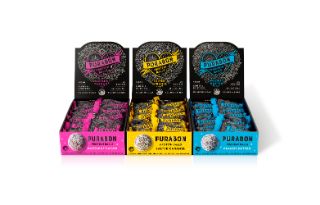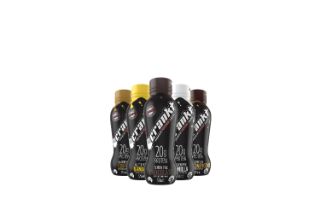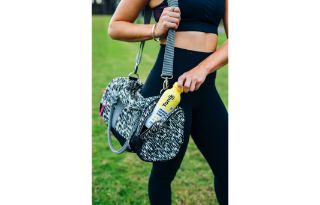Protein: it’s a buzzword in health conscious circles. We all know we should consume more, but busy lives and eating on the go can make it a hard task at times to get enough protein in our day.
The Ministry of Health’s guidelines for protein consumption for adults state the recommended intake of protein for men aged 19-70 is 64g per day. For men aged 70 plus this increases to 81g per day. Women (non-pregnant/lactating) should aim for 46g per day or 57g for those aged over 70.
However many of us likely fall short of these targets, either through a lack of time to prepare meals full of healthy protein sources such us lean meats, poultry, fish, eggs or plant based protein (think legumes or soy), or due to diets heavy in processed, fast or snack foods with low nutritional content.
The benefits of protein-rich diets are well evidenced. According to a study by the US National Library of Medicine, adding more high-protein foods could increase the metabolism by as much as 15-30 per cent. Other known benefits include better appetite control, fewer food cravings and improved body composition.
The latter has been a particular driver of protein powder consumption among those looking to bulk up through weight training and heavy exercise regimes. However, while they’re a convenient way to get a high protein fix, additional ingredients such as caffeine or other stimulants can mean these aren’t the right fit for everyone. Which is one of the reasons the mainstream market for protein-rich bars, drinks and balls is growing rapidly in Australia.
According to market research company IRI Australia, the nutritional snack food category is worth $29 million (for the MAT ending May 31, 2020). While the convenience channel showed a slight value decline (-3.2%) versus the same time last year, performance nutrition products continue to perform well, maintaining a steady growth value of 2.8%.
IRI analyst Justin Finney said they expect protein products to continue to perform well in the channel. “We will expect to see these products to continue to do well as they innovate to meet growing consumers’ needs around alternative protein sources such as hemp, pea and other plant based dairy alternatives as well as catering to new diets like Keto as seen by the Quest Keto range of products.”

Purabon are a leading brand in the market, making consumer-friendly plant-based, gluten, dairy and no added sugar snacks, which sales director Kerin O’Brien said is an important consideration for consumers. Their balls come in eye-catching packaging and enticing flavours, such as Coconut Cacoa, Choc Brownie, Matcha Cocao and more. All Purabon products are also endorsed gluten-free by Coeliac Australia, which is an important distinction for the brand.
“We find consumers of protein based snacks are looking for products which have an all-round health focus,” Mr O’Brien said.
“Vegan and plant-based food is a fast-growing category, with even major supermarkets creating two dedicated areas for this purpose. All Purabon products are vegan and plant-based and feature a healthy profile of protein, fibre and nutrients.“Consumers are always seeking gluten-free options but these are limited amongst baked goods like donuts or muffins, so this is where Purabon really shines.”
Mr O’Brien said consumer demand for protein-rich products has been steadily increasing over the last few years and that interestingly, the demand has reached rural and regional areas too, suggesting the trend towards better-for-you is not just city-centric. Another trend Mr O’Brien is seeing in the category is the desire for Australian made products, particularly since the onset of COVID-19.
“Consumers are demonstrating they are willing to pay a premium for Purabon’s locally- made vegan protein balls with outstanding flavour profiles rather than compromising on imported snacks”, he said.

The consumer profile for Purabon’s convenience customers tend to be young men and tradies picking up multiple balls for breakfast, often combining these with a beverage purchase. Women are also a big market, however these sales tend to be less time specific and are purchased as a healthy on-the-go snack. Purabon’s pro-biotic products have been particularly popular among women.
The impulsive nature of these purchase patterns make it especially important to have products front and centre at the point of sale, to disrupt shopper missions and drive sales.
“It is really important to have your impulse-purchases front and centre at point of sale – you could basically triple or quadruple sales by using POS positioning and build loyal consumers who repeat purchase Purabon products from your store,” Mr O’Brien said Freedom Foods is another strong performer in the category. Marketing Manager, Cereals, Snacks, Beverages – Plant based and Dairy, Hamish Thomson, said protein was attractive to consumers because of the additional nutritional benefits.
Protein also helped satisfy hunger and as new diet trends emerge, such as Keto, plant-based eating and collagen rich foods, the category continues to win as the key macro-nutrient offering, Mr Thomson said, adding he anticipated strong long-term growth for the category.
Freedom Foods has also seen mainstream consumer demand for protein snacks grow sharply, as brands deliver great-tasting innovation in new protein categories, such as yoghurts, cookies and chips, while also driving consistent innovation in protein bars and drinks. Mr Thomson said Freedom’s Crankt brand has been one of the leading lifestyle protein brands for more than two years and has seen growth upwards of 132% in grocery and 15% in p&c*.
Crankt is also riding the increased demand in protein snacking, extending its core range of five high protein and energy snacking bars into a step-up premium offering. The new larger sized Crankt Max Protein bars, launched in July, contain 20g of protein and feature premium native whey protein and come in great flavours: Salted Caramel, Choc Fudge and Raspberry & Coconut.

“We’ve seen significant growth in our high protein dairy-based beverages over the last 12 months as mainstream consumers such as tradies, switch from traditional flavoured milks which are high in sugar, to healthier alternatives like our high protein dairy beverages, which are low in sugar, deliver high protein, energy and taste great.” Mr Thomson said.
“If tradies are switching to healthier alternatives, we know we’re seeing a key pivot in traditional snacking habits and there’s a need to adjust snacking offers to accommodate this growing integration of functional health with everyday snacks.”
Omni Brands’ Tonik Nutrition is a new product range looking to fuel the market. The premium functional beverage brand has recently launched Tonik Pro primarily aimed at Millennials, who have a high consumption rate of protein drinks, driven by active lifestyles and a high nutritional awareness. Among the brand’s products is Tonik Pro – a high protein shake loaded with vitamins and minerals which is lower in fat and sugar.
Head of Sales at Omni Brands, Ash McMillan said the market had shifted to align with global trends and in line with people living busier lives.“We believe the market has experienced a positive shift primarily due to consumer health trends shaking things up, shifting demand away from the sugar-filed products to healthier alternatives, coupled with those living an active lifestyle looking for a protein-rich supplement to get them through the day,” Mr McMillan said.
“More recently there have been increased numbers of vegetarian and vegan consumers seeking plant-based protein solutions which is expected to be a source of continued growth for the category and the reason behind Omni Brands launching Tonik Plant Australia’s 1st plant based RTD protein shake this month.”

Luke Driver of Better Brands Group and co-founder and director of newly launched plant-based brand Greenback agreed consumers were looking to protein snacks for better-for- you options on-the-go and as meal replacements. Greenback’s bars have a broad appeal, but target the health-conscious consumer – they are dairy free, gluten free, preservative free, high in fibre, low in sugar and low in carb and offer a good source of protein. Mr Driver said Greenback’s biggest selling point was the taste, which he said was one thing he wouldn’t compromise on.
“Everyone who tastes a Greenback bar is genuinely surprised. We’ve been applauded for developing a range that nails the taste and texture profile in a category that so often misses the mark. Vegan protein bars often have an unpalatable dry and chalky tasteless texture. This is not the case with Greenback,” he said.
“Each of our four flavours – Hazelnut, Choc-Mint, Peanut Butter and Salted Caramel has a delicious taste that consumers will go back for! In fact, our customers believe our bars rival the most popular chocolate confectionary bars, and with less than a third of the sugar, it is a guilt-free indulgence.”
Mr Driver said he sees a huge growth potential for the category in convenience channels and would like to see more better-for-you snacking options front and centre in stores. He believes retailers who are doing this well out-perform the market. Others, he said, have the potential to develop healthy snacking destination areas and tap into the better for you platform that consumers are seeking out. Sampling campaigns, better category education, promotions and POS are also important elements that drive strong store growth.
*Source :IRI Grocery Data Sports and Diet and P&C Bars MAT 02/02/20.

